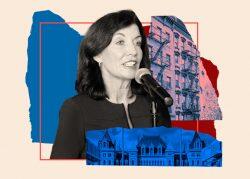UPDATED Sept. 1, 2021, 5:36 p.m.: As state lawmakers craft an eviction ban that shields tenants and meets the Supreme Court’s marching orders, lawyers say the legislation on the table won’t survive a legal challenge.
Under a preliminary version of the bill, which insiders say Gov. Kathy Hochul, Senate Majority Leader Andrea Stewart-Cousins and Assembly Speaker Carl Heastie have agreed to, landlords would have the opportunity to challenge a tenant’s declaration of hardship in court.
A judge would then rule on the validity of the tenant’s claim to have lost employment, hours or income, or experienced increased expenses. If it does not pass muster, an eviction proceeding can proceed. The new policy would run until Jan. 15.
The drafted language attempts to satisfy a Supreme Court ruling last month that the state’s previous moratorium was unconstitutional because it allowed tenants to self-declare hardship, thereby denying landlords due process.
Lawyers say the proposed workaround won’t cut it, either.
The requirements of due process have two prongs. One is that landlords must get a chance to dispute a claim, said Sherwin Belkin, founding partner at Belkin Burden Goldman. The draft legislation does that.
However, the tenant also has to provide evidence supporting the hardship claim. The legislation being considered only requires a renter to sign a statement affirming that they experienced hardship.
“If the tenant is not obligated to come forward with empirical evidence to support the claim, which the landlord can then review, verify and question about, there is no due process,” said Belkin, who represents landlords.
“Rather, this is an attempt to create an appearance of due process, while ensuring that the landlord’s ability to contest the claim is neutered.”
The Legislature could tweak the language before passing the bill. But Belkin said he does not believe the current draft “will pass constitutional muster.”
Read more


Ellen Davidson, an attorney with The Legal Aid Society, which defends tenants, said the hearing that the bill calls for would provide the tenant-side evidence that due process requires.
“You only have a hearing if you’re going to look at evidence,” Davidson said. “And the only way for a tenant to win that hearing would be to put forth evidence.”
Landlords’ lawyers, however, believe the legislation places the burden of proof with the property owner.
“Clearly the presumption is that the tenant statement is valid,” said Luise Barrack, an attorney at Rosenberg & Estis. Therefore, the owner has to make a motion and attest that the tenant has not experienced hardship, she said.
Establishing that proof could prove tricky, especially for larger landlords who don’t have direct contact with their tenants. Mom-and-pops could be better equipped to attest to tenants’ movements.
“I guess you’d have to say, ‘Well, I see the person going to work every day, carrying a briefcase,'” said Barrack.
The Rent Stabilization Association, which brought the suit that struck down the state’s previous ban, issued a statement Wednesday warning lawmakers of the thin line they have to walk.
“Tinkering with the previous law will not suffice, nor will inserting unenforceable language instead of actual mechanisms that address [the Supreme Court’s] concerns,” said Joseph Strasburg, president of the landlord group. “Legislators cannot just follow the laws that they like.”
Hardship declaration hearings could place additional stress on housing courts, which would need to field those cases alongside eviction proceedings.
Numerous mid-sized housing owners say they have at least one or two tenants who have not paid rent throughout the moratorium despite having the means to do so.
Sharon Redhead, the owner of 50 units in Flatbush, said one of her tenants hasn’t paid since 2019, before the pandemic. In a July interview, she said the renter was “on a Caribbean vacation with her family,” as evidenced by social media posts.
Under the proposed legislation, those renters could face eviction even with a new moratorium in place.
Landlords say the number of non-paying tenants has grown since the state’s rent relief portal opened. Renters realized they could tap the program to cover their rent only if they stopped paying.
In July, a spokesperson for the New York court system said housing courts had added “a number of [state] Supreme Court justices” to bulk up their roster before the moratorium expired.
The Office of Court Administration has made no further staffing changes to prepare for hearings over hardship declarations.
“As the sands keep shifting we are monitoring the changes and will make adjustments as necessary,” the spokesperson said.
Belkin warned that if the courts cannot provide hearings in a timely fashion, it would constitute another denial of due process.
This story has been updated with comments from Ellen Davidson and Luise Barrack.